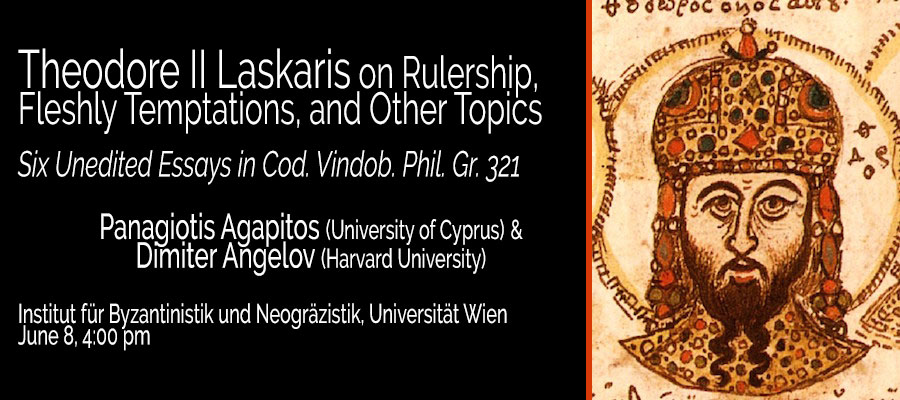Theodore II Laskaris on Rulership, Fleshly Temptations, and Other Topics: Six Unedited Essays in Cod. Vindob. Phil. Gr. 321, lecture by Panagiotis Agapitos (University of Cyprus) and Dimiter Angelov (Harvard University), Institut für Byzantinistik und Neogräzistik, Universität Wien, June 8, 2017, 4:00 pm
Although Emperor Theodore II Laskaris (1254-1258) is well known as an author of ambitious theo-philosophical treatises, political discourses and letters, a number of his short, essay-like contemplative texts are practically unknown. Among them figure six such unedited texts preserved in the Vindob. phil. gr. 321, a fine paper codex of the late 13th century, transmitting among other texts a number of Laskaris’ works. The six essays are embedded as small group in the middle of a larger collection of Laskaris’ letters and a set of his prose hymns.
The essays discuss a topic proposed at the beginning of each text. Thus Laskaris, who composed these texts after he had become emperor (as the title of the first essay reveals), discusses such topics as actuality and division in handling rulership, division of nature, the temptations of his own flesh (including the reading of love romances), hypocrisy as exemplified by the Metropolitan of Ephesos, the difficulty of being faced with one’s own personal sufferings though being a ruler. Theodore discusses matters dear to his heart reflecting his own very personal concerns in a highly complex philosophical language, imbued by emotional intensity and governed by a very loose syntax to the point that the texts give the impression of being dictated to a secretary in improvisation.
The paper will present the editorial method and the translation problems, while also placing the essays in the historical, intellectual and literary context of the Nicaean Empire.
